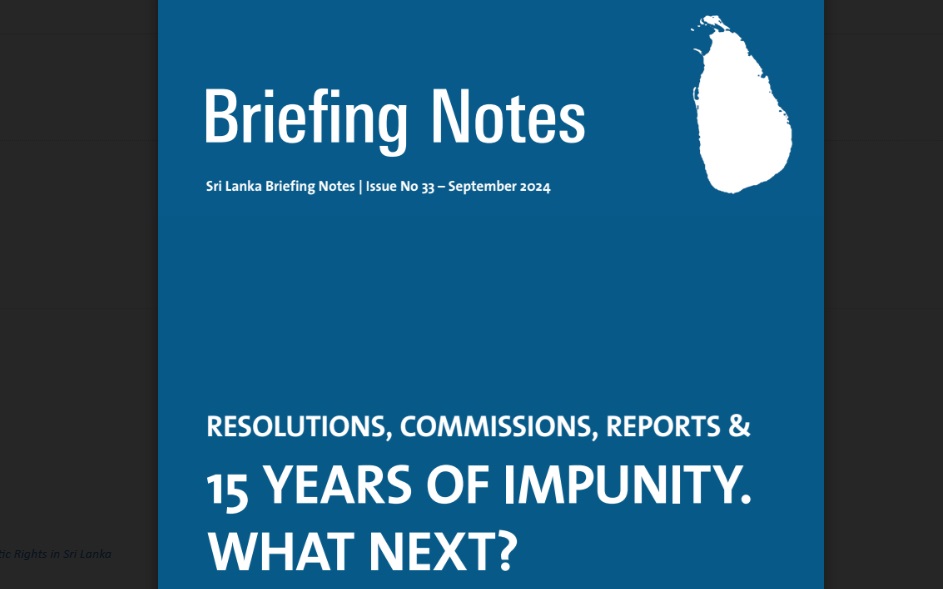Impunity for human rights violations in Sri Lanka has been a significant and persistent issue, particularly in the context of the country’s protracted civil war and its aftermath. The civil war, which lasted from 1983 to 2009, resulted in widespread atrocities committed by both the Sri Lankan government forces and the Liberation Tigers of Tamil Eelam (LTTE). Despite numerous allegations of serious human rights abuses, including extrajudicial killings, enforced disappearances, torture, and sexual violence, there has been a pervasive lack of accountability.
Read the full report as a PDF:SLB Briefing Note No 33, Sep 24 – 15 Years of Impunity & What Next
The final phase of the war saw alleged large-scale atrocities, particularly during the last months in 2009 when thousands of civilians were killed in what the UN has termed as “a bloodbath”. Reports like the UN’s Report of the Secretary-General’s Panel of Experts on Accountability in Sri Lanka (2011) highlighted credible allegations of war crimes. The documentary film ” Sri Lankan Civil War” by the British TV station Channel 4 provided graphic evidence of war crimes during the last phase of the war.
Even after the war ended, there have been reports of ongoing human rights abuses, including torture, unlawful detention, and suppression of dissent. Reports by United Nations and organizations such as Amnesty International and Human Rights Watch, The CIVICUS Monitor have documented these issues extensively.
Since 2009 Sri Lanka government has established several commissions, committees and institutions to address wat time human rights issues. United Nations Human Rights Council has passed resolution after resolution and has produced dozens of reports on the same the issue. International and as well as local human rights organisations have compiled hundreds of reports. The war-affected people in the North and East of Sri Lanka together with peace-loving citizens have been continuously campaigning for justice and accountability.
Despite all these efforts, 15 years after the war’s end, Sri Lanka remains a highly militarised country and in 2023, spent LKR 469 billion (8% of total expenditure) on defence. It is among the 10 countries with the highest number of armed personnel per capita in the world, Sri Lanka has 1.5 military personnel for every 100 people. Its peace ranking is 100 out of 167.
According to the Press Freedom Index, the RSF Sri Lanka ranking is 150 out of 180 for 2024. Sri Lanka has been categorised as a flawed democracy and ranks 70 out of 167 in the Democracy Index published by the Economist Group.[1] Sri Lanka ranks 77 out of 142 in the Rule of Law index of the World Justice Project.
Simple steps like the language rights of the Tamil-speaking people have not been fully implemented since independence so all front-line candidates of the upcoming presidential election have promised to ensure the policy of Tamil as a state language.
The Provincial Council system, which, was established by the 13th Amendment to the Constitution in 1998 has been scuttled and since 2014 no elections to the Provincial Councils have been held. Instead of devolving power to the provinces according to the 13th Amendment, the central government has taken back and weakened the devolved powers, especially in the areas of education, health and infrastructure development. Today many people consider the Provincial Council a white elephant.
Tamil people’s demand for a federal system of governance is the issue of accountability for wartime atrocities are almost nonexistent in the mainstream political discourse of the country.
Court proceedings of the emblematic cases mentioned in the UNHRC reports/resolutions have not been concluded. The campaign for an international investigation of wartime atrocities has not gathered enough strength to achieve its goal.
Sri Lanka looks like a more divided country on the ethnic lines especially between the North and East Tamils and Sinhalese today. For the first time, a joint Tamil candidate[2] is contesting for the presidency on the platform of recognition of the Tamil people as a sovereign people with the right to self-determination while, not a single Sinhalese presidential candidate shows a willingness to go beyond even a flawed power-sharing arrangement of the 13th Amendment to the constitution.
This is a reality that cannot be overlooked in any new action plan to bring justice and reconciliation for wartime human rights violations.
The mandate of the UNHRC resolution 51/1 on “Promoting reconciliation, accountability and human rights in Sri Lanka” ends with the ongoing 57th session of the UNHRC.[3] A new resolution on the same theme to continue the mandate is at the balance.
At this juncture of 15 years after the war’s end, Sri Lanka Brief revisits the national and international efforts to achieve reconciliation, accountability and human rights in Sri Lanka in the hope that it may provide a new impetus to find ways and means to end impunity for wartime rights violations in Sri Lanka.
[1] https://en.wikipedia.org/wiki/The_Economist_Group
[2][2] Read the manifesto of the Joint Tamil Candidate: https://srilankabrief.org/tamil-candidate-launches-sri-lankan-presidential-election-manifesto/
[3] Report of the High Commissioners report /HRC/57/19: Situation of human rights in Sri Lankan https://www.ohchr.org/en/documents/reports/ahrc5719-situation-human-rights-sri-lanka-comprehensive-report-united-nations
